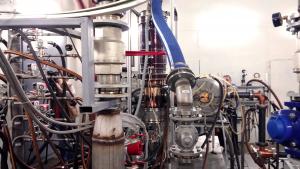Russian gyrotron prototype passes acceptance tests
29 May 2015
-
Alex Petrov, ITER Russia
For ITER, gyrotron technology will be pushed to the limit, with output beams of 1 MW (for 1000 sec) at the required 170 GHz.
Another milestone has been recorded in the Russian development program for the ITER gyrotrons—the 24 energy-generating units that will inject powerful microwave beams into the vacuum vessel to heat the plasma and drive plasma current.
At the industrial complex of Gycom Ltd in Nizhny Novgorod, the Russian gyrotron prototype successfully passed factory acceptance tests in the presence of ITER Organization representatives. The promising results will open the way to series production once the final design review will be successfully closed. The Russian Domestic Agency will supply 8 of ITER's 24 gyrotrons.
The tests, which took place from 11 to 15 May, are a key element in the procurement of the Russian gyrotron that will allow Russian industry to begin the fabrication of this important ITER system. The official factory acceptance tests have to verify key parameters of the prototype, including output beam characteristics, power parameters (>0.95 MW), efficiency (exceeding 50 percent), modulation regimes (1-5 kHz), and durability parameters (>95 percent); test control and parameter registration; and confirm the main technical solutions for the system. Most of these parameters were successfully monitored during these tests, aiming to consolidate the series gyrotron factory acceptance test program and allowing the preparation of the Final Design Review with full confidence.
According to the ITER schedule, Russian-fabricated gyrotrons will be the first to be delivered to ITER.
The first gyrotron was developed at the Russian Applied Physics Institute (Nizhny Novgorod) in 1964. For ITER, gyrotron technology will be pushed to the limit, with output beams of 1 MW (for 1000 sec) at the required 170 GHz. Four ITER Members—Europe, Japan, Russia and India—are involved in gyrotron procurement. According to the ITER schedule, Russian-fabricated gyrotrons will be the first to be delivered to ITER.
The development of the Russian gyrotron has been carried out with the cooperation of the Russian Domestic Agency for ITER, the Institute of Applied Physics (Russian Academy of Sciences), Gycom Ltd., the Kurchatov Institute, and CJSC RTSoft.
News from the Japanese and European gyrotron development programs was recently reported in Newsline.



